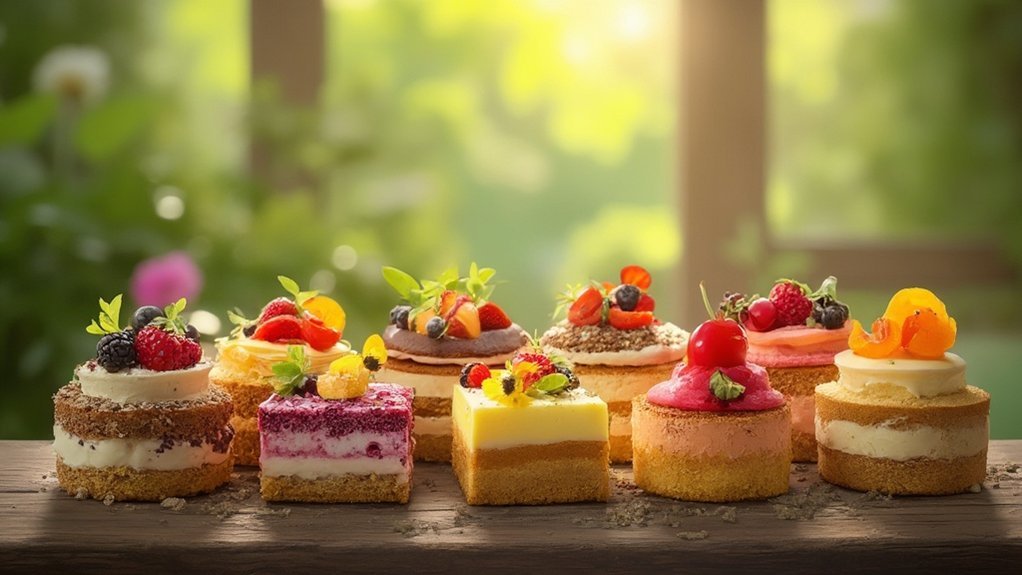Why More People Are Choosing Organic Cakes Over Conventional
More people are opting for organic cakes instead of conventional ones due to a desire for transparency, safety, and high-quality ingredients. As awareness of health benefits grows, consumers recognise that organic cakes often contain superior ingredients and are produced ethically. Additionally, many appreciate supporting local economies and being kinder to the environment. Interested in what else is driving this trend? There's plenty more to discover about the expanding market for organic cakes.
Key Takeaways
- Consumers are increasingly prioritising health and safety, which drives their preference for organic cakes that meet strict production standards.
- Clear labelling and certifications build trust in organic cakes, helping consumers make informed choices about what they eat.
- The growing demand for sustainable and ethical production methods encourages shoppers to opt for organic cakes over conventional alternatives.
- Rising awareness of health benefits associated with organic ingredients boosts the popularity of organic cakes.
- Social media and effective marketing strategies highlight organic cakes, appealing to health-conscious consumers looking for quality options.
Growing Consumer Awareness of Food Quality
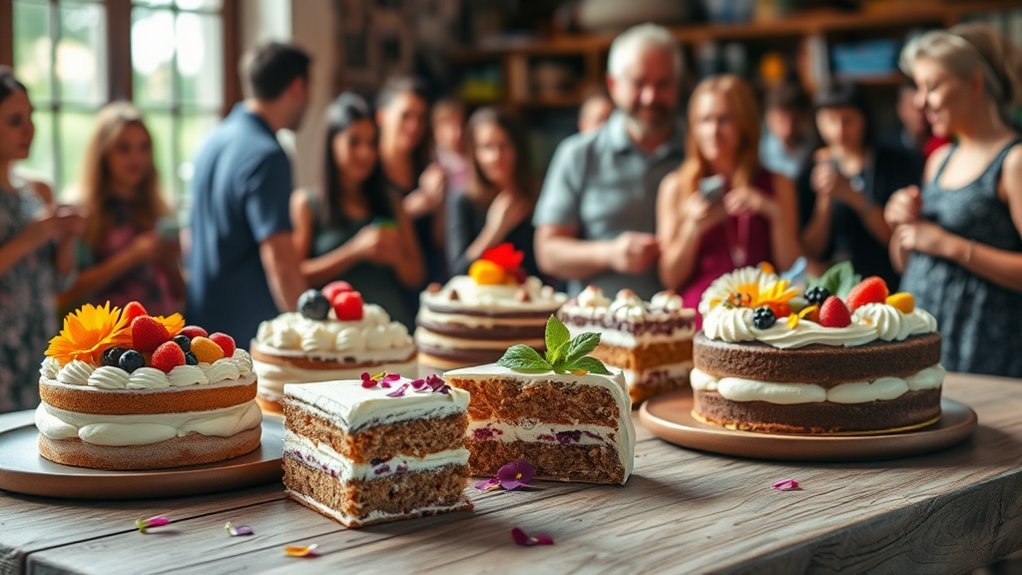
As awareness of food quality grows, consumer expectations for safety and transparency are changing. Many of you now prioritise hygiene standards and quality assurance in food production. In fact, over 60% of consumers feel hygiene rules aren't adequately followed, so your preference for safe products is stronger than ever. You often rely on sensory checks, such as smell and visual inspection, to evaluate food quality. Clear labels and expiry dates also play a significant role in your purchasing decisions. As you consider the environmental and ethical implications of your choices, it's evident that understanding food quality factors influences your buying habits. Sustainable farming practices in organic baking promote soil health, enhancing your confidence in the organic cakes you choose over conventional ones, as you seek transparency and assurance, particularly when choosing organic cakes over conventional ones.
The Rise of Health and Wellness Trends
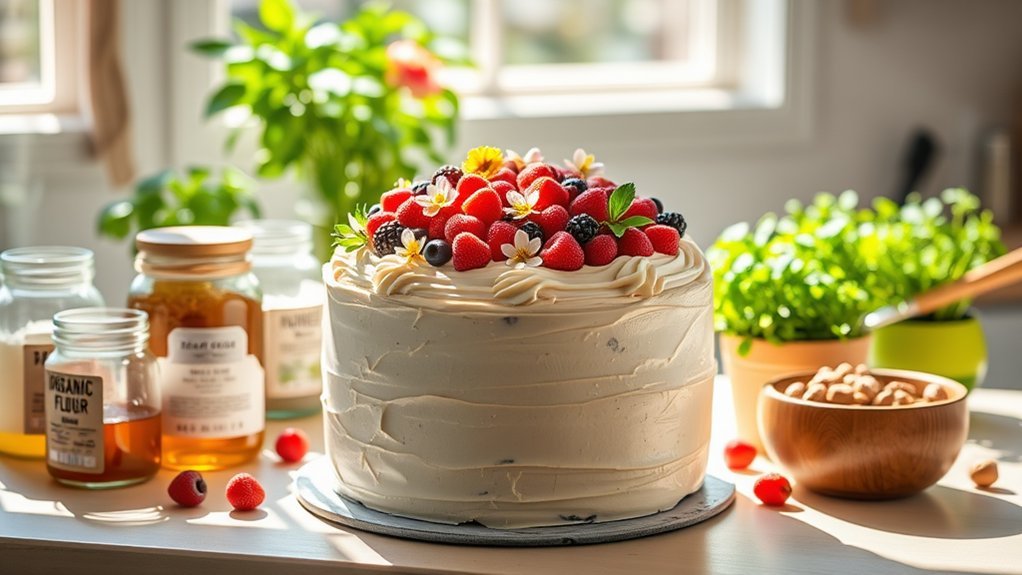
As you delve into the realm of organic cakes, you'll notice a growing trend in health and wellness that's influencing what consumers choose. Plant-based options are becoming increasingly popular, and the demand for gluten-free products is on the rise, showing a move towards more inclusive diets. Additionally, innovative sugar-free alternatives are emerging, appealing to those who want to enjoy treats without sacrificing their health. This trend aligns with the increased integration of conventional and alternative medicine, as consumers are more focused on holistic practices that prioritize overall well-being. Moreover, the quality of organic ingredients used in these cakes often leads to better taste and nutritional benefits, further driving consumer preference.
Plant-Based Options Popularity
As awareness of health, climate change, and animal welfare grows, more consumers are opting for plant-based options, leading to a notable rise in their popularity. This shift is largely driven by flexitarians who are reducing their meat consumption for both health and environmental reasons. The UK's plant-based market is currently valued at £357 million, with a particular surge in interest for vegan pastries and desserts. Interestingly, 3% of UK adults identify as vegan, which highlights the increasing acceptance and adoption of plant-based diets. Additionally, many consumers are drawn to organic cakes for their perceived health benefits and eco-friendly qualities. Younger people, especially those aged 18-24, are at the forefront of this trend, with 4% of them adopting plant-based diets. The market is expected to grow at a CAGR of 10.5%, indicating a broader societal move towards healthier and more sustainable eating that accommodates various tastes and lifestyles.
Gluten-Free Demand Growth
The growing popularity of plant-based diets has led to another significant trend in the food industry: the increasing demand for gluten-free products.
As more individuals focus on health and wellness, gluten-free innovations are reshaping consumer choices. Here are the key factors driving this change:
- Awareness of health issues such as coeliac disease and gluten intolerance is rising.
- Consumers are becoming more informed about the potential health risks linked to gluten.
- Supermarkets now stock extensive ranges of gluten-free products, making them more accessible.
- Alternative grains like quinoa and teff are diversifying product offerings.
- Social media influencers are advocating for gluten-free diets, helping to raise awareness.
This evolving landscape indicates that gluten-free products are no longer just a niche market; they're becoming a staple for many people seeking healthier lifestyles.
Innovative Sugar-Free Solutions
With rising health concerns and a growing focus on wellness, innovative sugar-free solutions are becoming increasingly popular in the UK confectionery market.
The sugar-free sector is expected to reach around £2 billion by 2024, as over 40% of consumers look for low-sugar alternatives. Natural sweeteners such as stevia and monk fruit are at the forefront of this movement, showing significant growth.
The Clean Label Movement promotes transparency, ensuring that these sugar substitutes not only taste good but also offer nutritional benefits.
As more people prioritise health-conscious choices, sugar-free sweets, chocolates, and gum are gaining traction, helping consumers manage their dietary goals and tackle issues like diabetes and obesity.
Embracing this trend can lead to a healthier lifestyle.
Market Growth and the Future of Organic Cakes
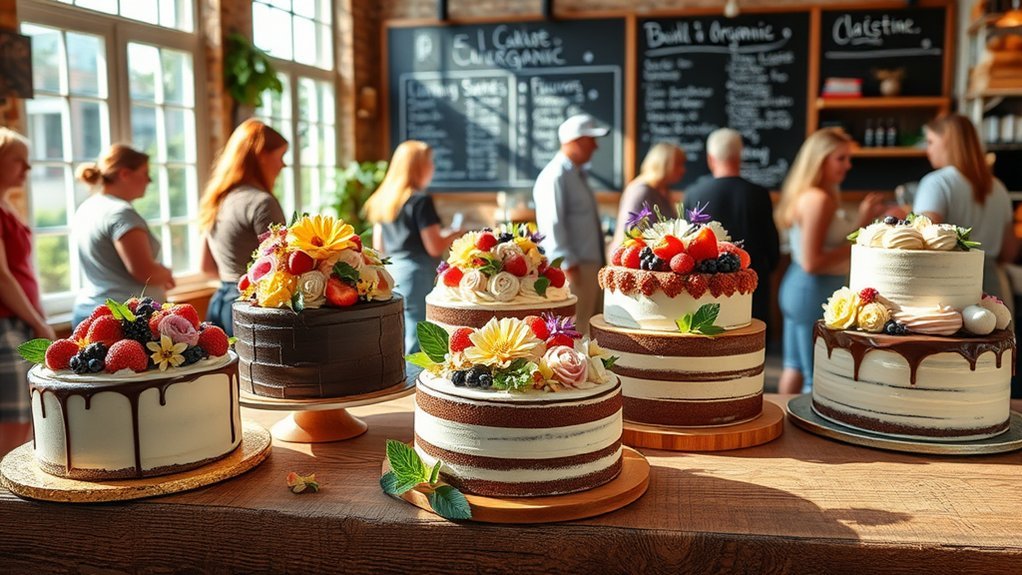
As consumer preferences increasingly lean towards healthier options, the organic cake market in the UK is witnessing notable growth, driven by a greater awareness of the benefits of organic products.
Health concerns and a preference for non-GMO options are significantly influencing buying habits.
Key drivers of this growth include:
- Rising disposable incomes leading to a greater demand for organic products
- Innovations in organic ingredients making these cakes more appealing
- Enhanced visibility of organic options in restaurants
- The expansion of online shopping platforms widening market accessibility
- Major retailers increasing their range of organic offerings
By effectively segmenting the market, brands are reaching health-conscious consumers.
The UK organic cake market is projected to grow at a CAGR of 8.5% from 2021 to 2026, indicating a bright future for organic cakes.
Environmental Concerns and Sustainability

Choosing organic cakes isn't just a treat for your taste buds; it's a commitment to sustainability.
By opting for sustainably sourced ingredients and ethical production methods, you help minimise carbon footprints and support local communities.
This understanding allows you to make informed choices about the cakes you indulge in.
Sustainable Sourcing Practices
Sustainable sourcing practices play a vital role in the discussion around organic versus conventional cakes, particularly in relation to environmental issues in food production.
When considering organic cakes, it's important to note how these practices benefit the planet:
- Organic farming avoids synthetic pesticides, which improves soil and water quality.
- Fair partnerships ensure that farmers and workers receive just compensation.
- Sourcing ingredients locally cuts down on transportation emissions and supports local economies.
- Transparency in the supply chain builds trust in the ingredients used.
- Eco-friendly bakeries help promote biodiversity, aiding in sustainable agriculture.
Reducing Carbon Footprints
When it comes to choosing between organic and conventional cakes, taste and ingredient quality often take centre stage.
However, the environmental impact of your choice is equally important. By selecting organic cakes, you're helping to reduce your carbon footprint. Organic ingredients, which are cultivated without synthetic fertilisers, contribute to lower pollution and emissions.
Opting for locally sourced ingredients can further cut down transportation emissions, bolstering both local economies and sustainable baking practices.
Additionally, bakeries that use energy-efficient equipment minimise energy consumption during baking. Using compostable packaging also helps significantly reduce waste.
Every small decision you make plays a part in creating a healthier planet, ensuring your delightful cake isn't just a treat for you, but also a responsible choice for the environment.
Ethical Production Methods
Choosing organic cakes satisfies your sweet tooth and supports ethical production methods that prioritise environmental sustainability. By opting for organic, you're backing practices that benefit both the planet and your local community.
Here are some key aspects of ethical production:
- Supports local economies by sourcing ingredients from nearby farmers.
- Minimises environmental harm by reducing harmful chemicals.
- Promotes sustainable agriculture, helping to preserve soil health and biodiversity.
- Encourages eco-friendly packaging, reducing plastic waste.
- Fosters healthier products, ensuring ingredients are free from harmful residues.
Making ethical choices in your food can have a positive impact on your community and the environment.
Taste and Quality Perceptions Among Consumers

How do consumers perceive the taste and quality of organic versus conventional cakes? Many of you may find that your taste expectations play a significant role in your choices.
While organic cakes are often selected for health benefits, their taste perceptions tend to fall short compared to conventional options. Research shows that taste ratings for organic products are usually lower, which can influence your willingness to pay extra.
Interestingly, the organic label can affect how you perceive taste, even if the product is the same as its conventional alternative. If you prioritise organic ingredients, you might rate the taste higher, particularly for specialty items like croissants.
Conversely, if you favour local produce, you may value freshness over the organic label when noticeable taste differences arise.
The Impact of Urbanization on Organic Cake Demand
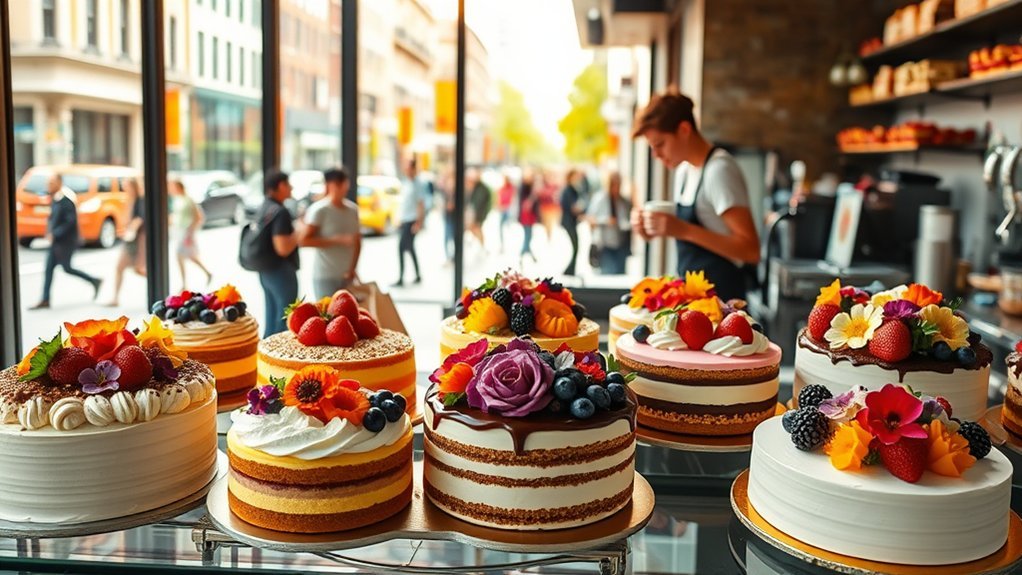
As urban areas grow and lifestyles change, demand for organic cakes is increasing, largely due to a rising awareness of health among consumers.
Urbanisation significantly affects food choices, aligning them with health priorities that reflect modern urban living. Here are the key factors driving this trend:
- Easier access to information about food quality
- Higher disposable incomes for premium purchases
- A stronger emphasis on sustainability and wellness
- Urban consumers exploring diverse dietary options
- A preference for transparency and non-GMO products
With these influences, organic cakes are becoming a common choice for those seeking healthier, sustainable options.
Living in the city, opting for organic not only satisfies your sweet tooth but also supports your commitment to health and the environment.
Innovative Ingredients and Dietary Options
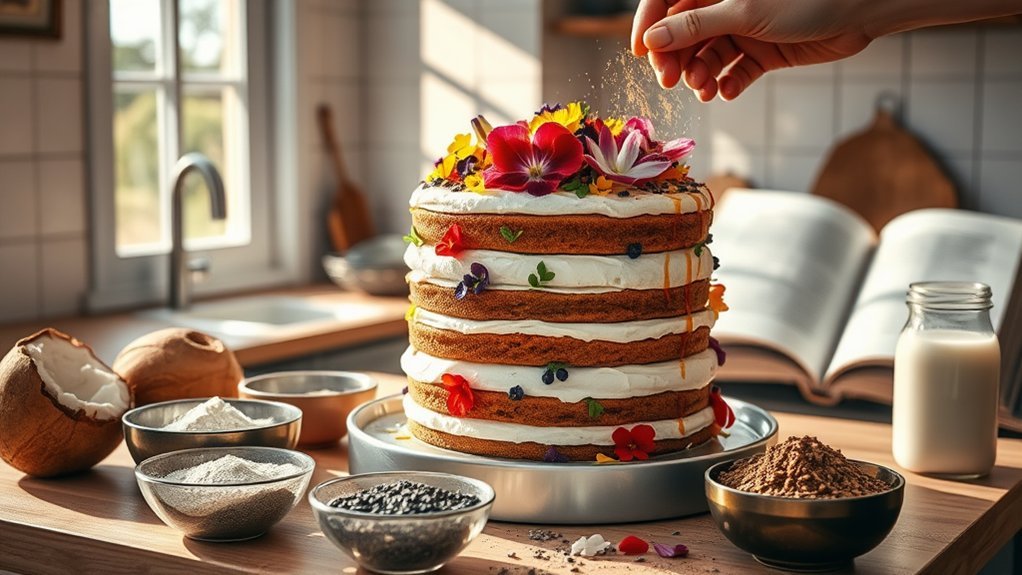
As consumers become more health-conscious, the world of organic cakes is evolving. Many bakers are now using innovative ingredients like flaxseed and chia seeds, which add nutritional benefits such as omega-3 fatty acids and antioxidants.
Natural sweeteners are gaining popularity, as more people choose to avoid refined sugars for a healthier option. Gluten-free alternatives are also on the rise, catering to those with sensitivities, while vegan cakes often incorporate grains and fruits to enhance flavour and nutrition.
Ancient grains like quinoa, along with alternative flours such as almond and coconut, not only increase protein content but also introduce unique flavours. These trends reflect a growing appetite for healthier and more inclusive baking choices.
The Role of Transparency in Building Trust
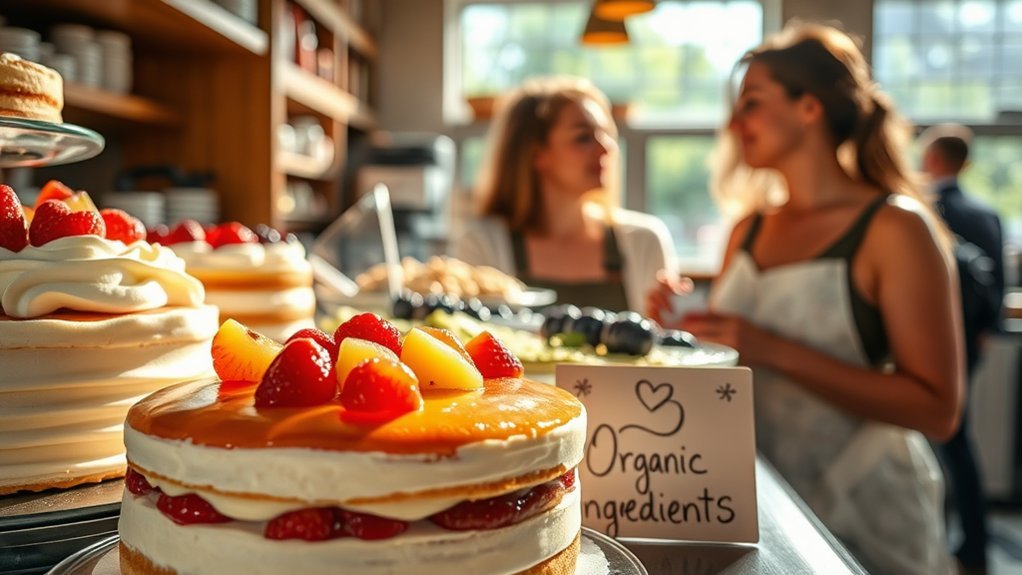
In today's world, consumers seek authenticity, making transparency vital for building trust between brands and customers. By adopting trust-building practices, brands can significantly boost consumer confidence.
Here are some key benefits of transparency:
- Clear Ingredient Lists: Providing detailed ingredient information enables consumers to make informed choices.
- Certification Information: Certifications, such as Fairtrade or organic labels, verify product authenticity, enhancing brand trust.
- Nutritional Information: Comprehensive nutritional details help consumers align choices with their health goals.
- Production Process Disclosure: Sharing sourcing and production practices fosters trust and encourages loyalty.
- Avoidance of Vague Terms: Clear labelling removes ambiguity, building consumer confidence.
As the demand for transparency grows, brands that prioritise these practices won't only meet consumer expectations but also forge lasting relationships, ultimately driving loyalty and sales.
Economic Factors Influencing Organic Cake Pricing
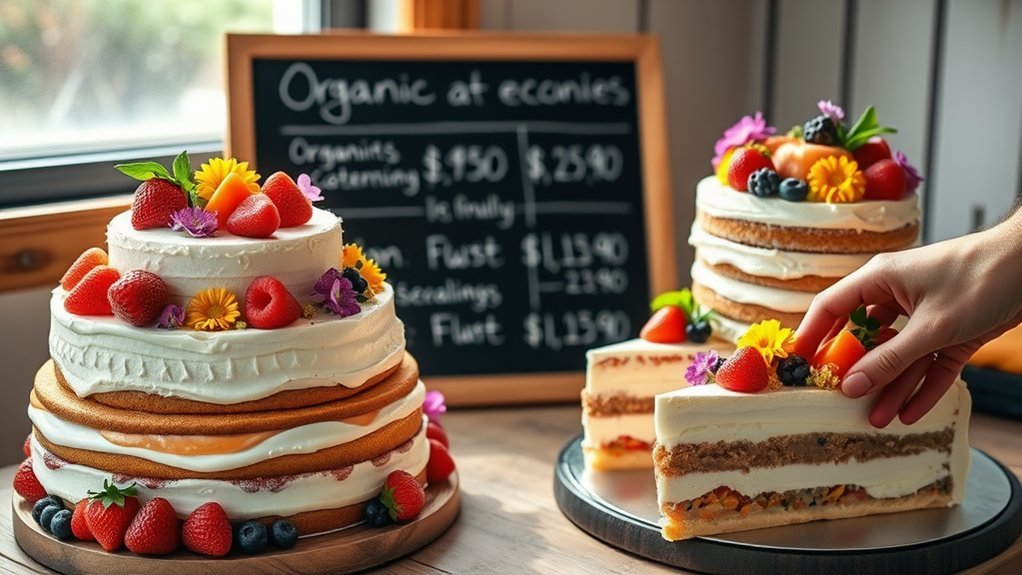
Understanding the economic factors that affect organic cake pricing is crucial for consumers and producers alike. The sourcing of raw materials is a key consideration; organic ingredients such as flour, sugar, and dairy typically cost more than their conventional counterparts. Seasonal variations can also influence these prices.
Moreover, production and labour costs tend to be higher due to the need for specialised equipment and skilled workers. As the demand for organic cakes increases, producers may implement pricing strategies that capitalise on this trend, allowing them to charge a premium to health-conscious customers. However, competition from traditional bakeries can exert downward pressure on prices.
Additionally, the costs associated with certification and compliance are significant, as producers must ensure they remain profitable while showcasing the quality and benefits of their organic products.
Marketing Strategies for Organic Cake Producers
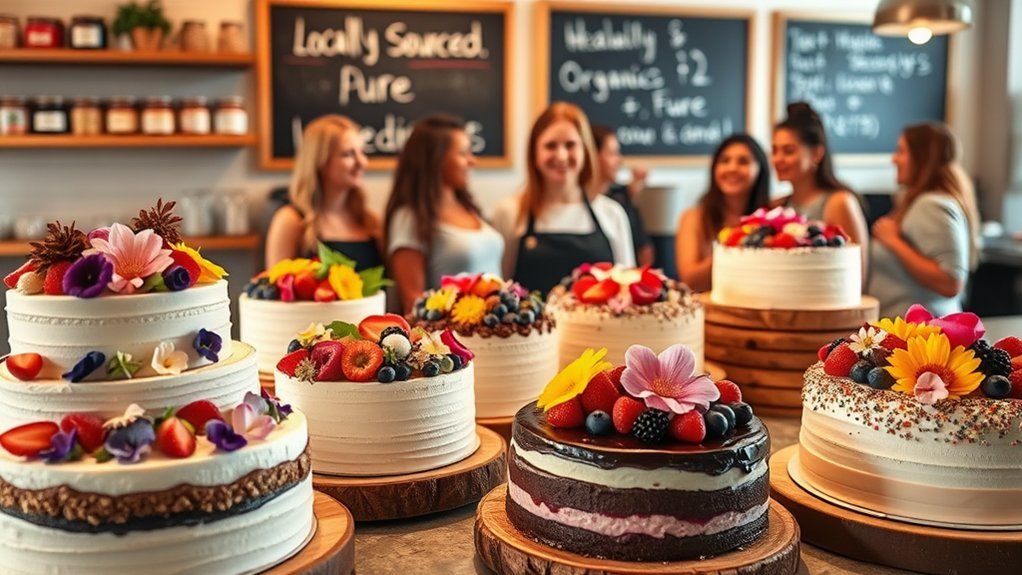
When marketing your organic cakes, focus on the quality of your ingredients to differentiate yourself from standard options and attract health-conscious customers.
Highlighting your sustainable practices aligns with consumer values and boosts your brand's appeal.
Additionally, engaging social media campaigns can foster a sense of community and loyalty, making your cakes the preferred choice for eco-friendly dessert enthusiasts.
Emphasizing Quality Ingredients
As consumers increasingly value health and sustainability, highlighting quality ingredients has become essential for organic cake makers.
By prioritising ingredient sourcing and quality assurance, you can earn the trust of health-conscious shoppers. Here are some effective strategies:
- Ensure transparency in ingredient labelling.
- Promote health benefits, such as reduced chemical residues.
- Highlight the use of natural sweeteners and organic spices.
- Differentiate your products with USDA organic certification.
- Explore plant-based alternatives to appeal to a wider audience.
Highlighting Sustainability Practices
Organic cake producers can significantly boost their appeal by showcasing sustainability practices alongside high-quality ingredients. By adopting eco-friendly baking methods and sourcing ingredients responsibly, you can attract environmentally conscious consumers. Emphasising your commitment to local sourcing not only reduces your carbon footprint but also supports biodiversity.
| Sustainability Practice | Benefits | Consumer Appeal |
|---|---|---|
| Sustainable Sourcing | Reduces pollution, supports biodiversity | Builds trust through transparency |
| Energy Efficiency | Lowers carbon emissions | Demonstrates commitment to sustainability |
| Waste Reduction Strategies | Minimises food waste | Encourages community engagement |
Engaging Social Media Campaigns
How can engaging social media campaigns boost your organic cake business? By using platforms like TikTok and Instagram, you can highlight your baking skills and showcase your beautiful creations through eye-catching visuals.
Here are some straightforward strategies to enhance your brand's online presence:
- Share recipe videos to spark follower engagement.
- Use interactive polls to collect feedback and ideas.
- Post behind-the-scenes content to build authenticity.
- Collaborate with influencers to broaden your audience.
- Encourage user-generated content to foster community.
These tactics can help you connect with your audience and grow your business effectively.
The Influence of Consumer Education on Choices
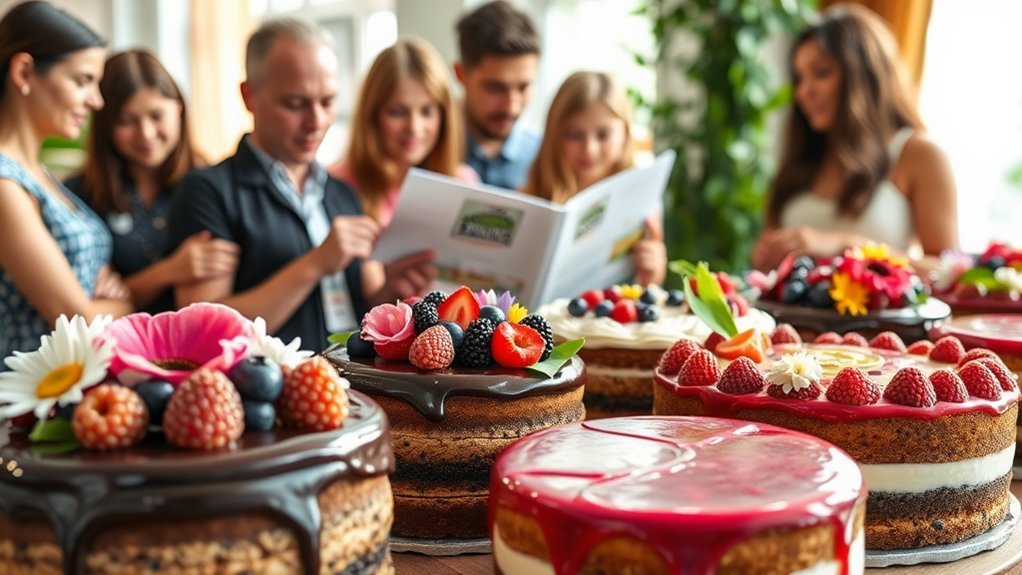
What influences your choice between organic and conventional cakes? A lot of it boils down to consumer education. The more informed you are, the better your decisions will be. Many people think organic cakes are healthier, but a lack of knowledge can complicate your choices. Here's a quick comparison:
| Factor | Organic Cakes | Conventional Cakes |
|---|---|---|
| Perceived Health | More nutritious | Less nutritious |
| Price Sensitivity | Generally pricier | Usually cheaper |
| Knowledge Influence | More likely to buy | Less likely to buy |
| Education Source | Retailer resources | Limited awareness |
| Trust in Products | Higher trust | Varies |
The Appeal of Ethical Sourcing Practices
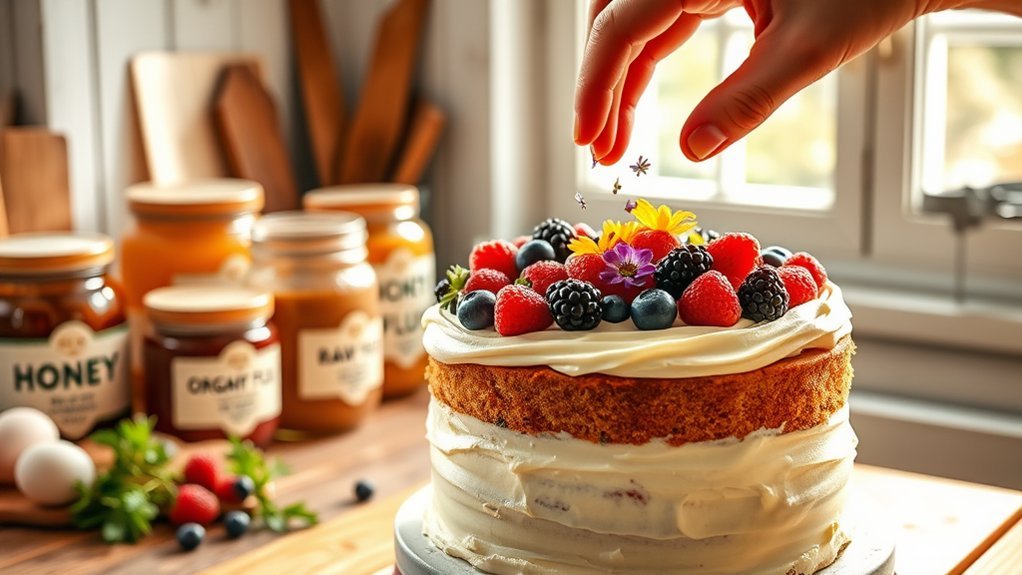
As consumers in the UK become more conscious of their purchasing decisions, ethical sourcing practices are increasingly appealing.
When you buy a cake, for instance, you're not just indulging in a treat; you're supporting ethical consumerism and sustainable practices. This change in attitude signals a rising call for integrity in food production.
- Builds trust and loyalty towards brands
- Supports local economies through sourcing
- Ensures fair labour practices for equitable trade
- Lowers carbon footprints with organic ingredients
- Promotes transparency in supply chains, boosting credibility
Frequently Asked Questions
Are Organic Cakes More Expensive Than Conventional Cakes?
Yes, organic cakes tend to be pricier than conventional ones, mainly because they use higher-quality ingredients and adhere to stricter production standards. However, the price difference is decreasing, making organic cakes more affordable for those looking for healthier options. For instance, while a traditional chocolate cake might cost £15, an organic version could be around £20. As demand grows, you may find that the cost of organic cakes becomes more reasonable.
How Can I Identify Truly Organic Cakes?
To identify genuinely organic cakes, look for clear labelling that indicates organic ingredients and certifications. Check for recognised seals, such as the Soil Association logo, which confirms that the ingredients are sustainably sourced. This ensures you're making a quality choice.
Do Organic Cakes Have a Shorter Shelf Life?
Organic cakes are like delicate flowers; they often have a shorter shelf life. Due to the use of higher-quality ingredients and fewer preservatives, they need proper storage to keep them fresh and enjoyable for longer.
Can I Find Organic Cakes at Local Bakeries?
You can certainly find organic cakes at local bakeries across the UK. Many shops focus on using locally sourced ingredients to support nearby farmers. Take a look at your local bakeries for custom cakes made with certified organic products. Enjoy the tasty options available!
What Certifications Should I Look for in Organic Cakes?
When selecting organic cakes, look for certifications such as the Soil Association and Non-GMO Project Verified. Ensure the cake packaging clearly states that the ingredients are organic, which confirms quality and compliance with rigorous production standards. Your health deserves the best!
Conclusion
As you explore the world of cake options, it's evident that organic varieties are becoming increasingly popular. With a heightened awareness of food quality, health trends, and sustainability, many are enjoying the advantages of organic cakes. The rich flavours and ethical sourcing not only please your palate but also align with your values. Choosing organic is not merely a trend; it's a tasty choice towards a healthier and more sustainable future for everyone.

